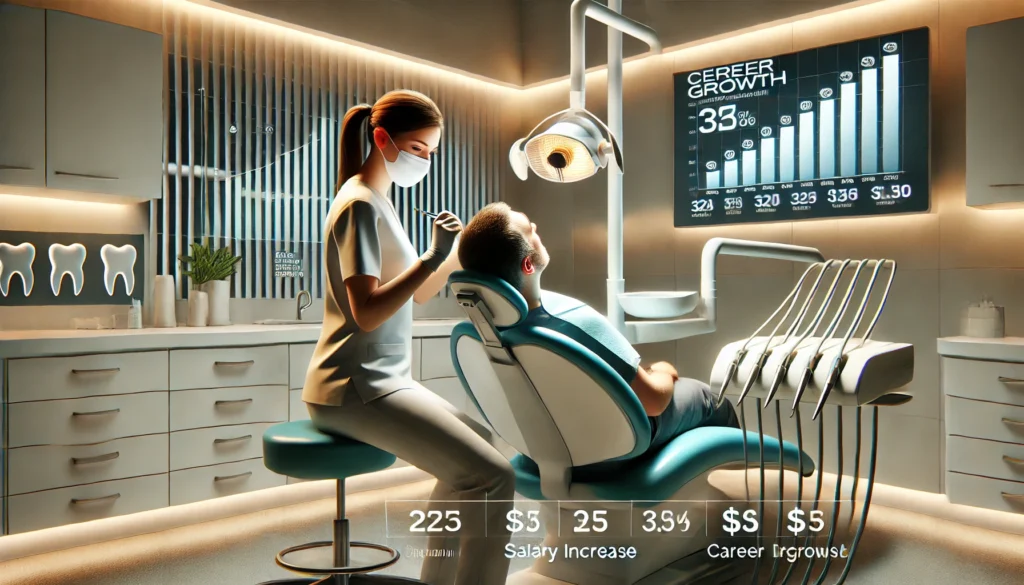Dental hygienists play a crucial role in oral healthcare, yet many struggle to increase their salaries despite years of experience and growing expertise. Whether you’re an experienced professional or just starting your career, there are strategies you can use to ensure you’re being compensated fairly for your hard work. This article will walk you through actionable tips and lesser-known strategies that can help you boost your dental hygienist salary—perhaps even overnight.

Understanding Your Current Value as a Dental Hygienist
Before discussing strategies to increase your salary, it’s essential to know where you stand in the current market. This understanding will give you the confidence you need when negotiating with your employer or exploring new opportunities.
Factors Influencing Your Salary
- Location: Salaries for dental hygienists can vary greatly depending on the geographic region. For example, professionals in urban areas tend to earn more than those in rural settings, though the cost of living might offset this increase.
- Experience Level: As with most careers, experience is a significant factor. The more years you’ve been practicing, the higher your salary potential. Document your career milestones to support your negotiation efforts.
- Specialized Certifications: Additional certifications, such as in administering local anesthesia, laser treatments, or advanced periodontal care, can make you more valuable to a dental practice and justify a higher salary.
- Type of Employer: The type of dental practice or organization you work for—whether it’s a private clinic, hospital, or public health institution—also impacts your earning potential. Larger organizations might offer better benefits, while smaller clinics may provide more flexibility.

Common Mistakes to Avoid When Negotiating a Salary Increase
Many dental hygienists unknowingly make mistakes when they attempt to negotiate a raise. These pitfalls can prevent them from receiving the salary they deserve.
1. Not Doing Enough Research
Walking into a salary negotiation without solid research is a critical error. Always enter the discussion armed with facts. Use resources like industry salary surveys, job postings, and online salary calculators to determine the average pay for your role in your area. This information serves as a benchmark and allows you to set realistic expectations.
2. Failing to Highlight Your Unique Contributions
Every dental hygienist brings a unique set of skills to their role. Don’t focus solely on the years you’ve worked when negotiating. Highlight your specific contributions to the practice, such as improved patient satisfaction scores, increased patient retention, or any leadership roles you’ve taken in the clinic.
3. Accepting the First Offer Without Negotiation
Many professionals are quick to accept the first offer they receive, thinking it might be the best they’ll get. However, employers typically expect some negotiation. Politely counter the initial offer by providing evidence of your worth—such as salary comparisons and performance metrics.
4. Not Considering Other Forms of Compensation
While the base salary is important, don’t overlook other forms of compensation that can add value to your overall package. Things like flexible working hours, professional development opportunities, bonuses, and healthcare benefits can enhance your compensation package without requiring a direct salary increase.

Proven Strategies to Boost Your Dental Hygienist Salary
Now that we’ve covered common mistakes, let’s look at some actionable strategies to help you increase your salary.
1. Expand Your Skillset and Credentials
One of the fastest ways to command a higher salary is by earning additional certifications. Consider investing in advanced training in:
- Local Anesthesia: Gaining the ability to administer local anesthesia can significantly increase your value, especially in states where dental hygienists are authorized to provide these services.
- Laser Therapy: Certification in laser therapy can allow you to assist with more advanced periodontal treatments, which can justify a higher rate of pay.
- Restorative Functions: Some states allow dental hygienists to place temporary fillings or assist in restorative dental procedures, opening the door to higher compensation.
By expanding your qualifications, you not only increase your earning potential but also open doors to more job opportunities.
2. Leverage Your Network
Networking within the dental industry can provide valuable insights into salary trends and job opportunities. Professional organizations like the American Dental Hygienists’ Association (ADHA) or attending industry conferences can give you access to salary reports and potential employers. Often, job opportunities offering better compensation come through professional connections rather than traditional job postings.
3. Consider Working in a Specialized or High-Demand Field
Certain specialties within dental hygiene, such as pediatric care, periodontal therapy, or working in a hospital setting, often offer higher pay than general practice. Additionally, certain geographic areas may have a higher demand for dental hygienists, which can lead to increased salaries. If you’re willing to relocate or specialize, you may be able to secure a higher-paying position.
4. Negotiate Salary When Changing Jobs
One of the best times to negotiate your salary is when you’re starting a new job. Employers expect some level of negotiation at this stage, and you may have more leverage than when asking for a raise at your current job. Be sure to research the average salary for your role and level of experience in the new location, and don’t hesitate to ask for a competitive offer.

5. Track and Present Your Achievements
When asking for a raise, being able to demonstrate your impact on the practice is crucial. Keep a detailed record of your contributions, such as:
- Increased patient satisfaction scores
- Higher patient retention rates
- Streamlining office procedures to save time or money
- Positive feedback from patients or peers
These achievements show your employer that you’re an asset to the practice and deserve a salary that reflects your contributions.
When to Ask for a Raise
Timing is everything when it comes to salary negotiations. Here are a few ideal moments to approach the topic with your employer:
- After a Performance Review: If you’ve just had a positive performance review, it’s the perfect opportunity to discuss a raise. Your employer is already thinking about your contributions and value to the practice.
- Following a Significant Achievement: Did you complete a major project or help the practice increase its revenue? Use this success as leverage when asking for more compensation.
- After Completing New Training or Certification: If you’ve recently earned a new certification or skill, use it as a reason to discuss your salary. Demonstrating new qualifications shows your commitment to the profession and your willingness to take on more responsibility.
Consider Alternative Paths to Increasing Your Income
While salary negotiations are essential, there are other ways to boost your overall income as a dental hygienist.
1. Work Overtime or Take on Extra Shifts
If your practice allows, taking on additional shifts or overtime can be a straightforward way to increase your earnings. Some clinics also offer premium pay for weekend or holiday work.
2. Explore Part-Time or Contract Work
In addition to your full-time position, you can explore part-time or contract work with other dental practices. This not only supplements your income but also allows you to build your network and increase your skillset.
3. Start a Side Business
Many dental hygienists supplement their income by starting side businesses related to dental care, such as selling dental products or offering coaching services to dental hygiene students.
Conclusion: Take Control of Your Earning Potential
Boosting your salary as a dental hygienist is within your reach if you take the right steps. By avoiding common mistakes, expanding your skills, and negotiating wisely, you can increase your earning potential significantly. Remember, your salary reflects your value to the practice—so don’t be afraid to ask for what you deserve.







